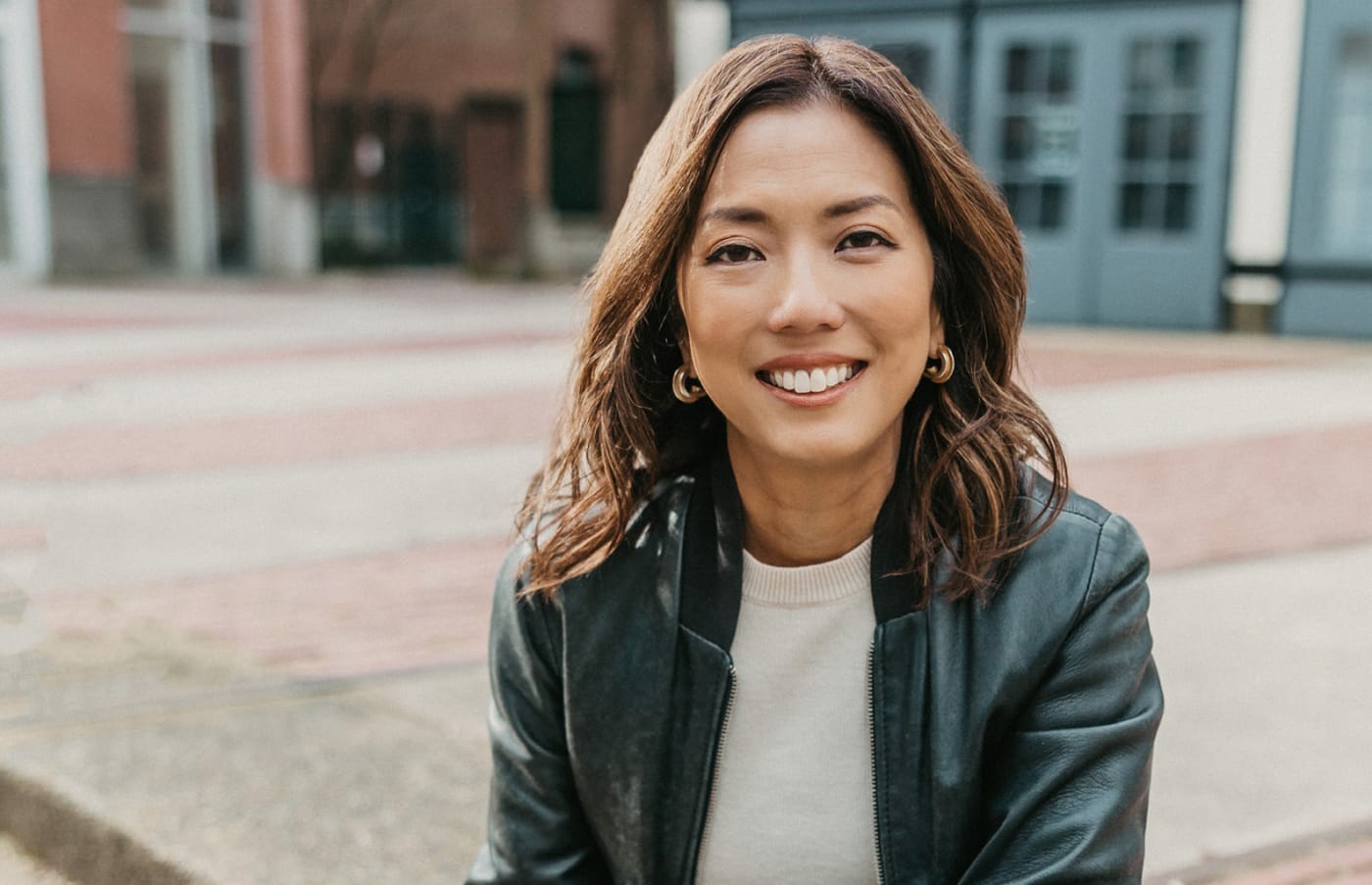
Join Gear Up for Gilly on Aug. 24-25 for the Tour de Cure, presented by Wheaton Precious Metals — B.C.’s largest cycling fundraiser to fuel research and provide better outcomes for people facing cancer. Sign up at tourdecure.ca.
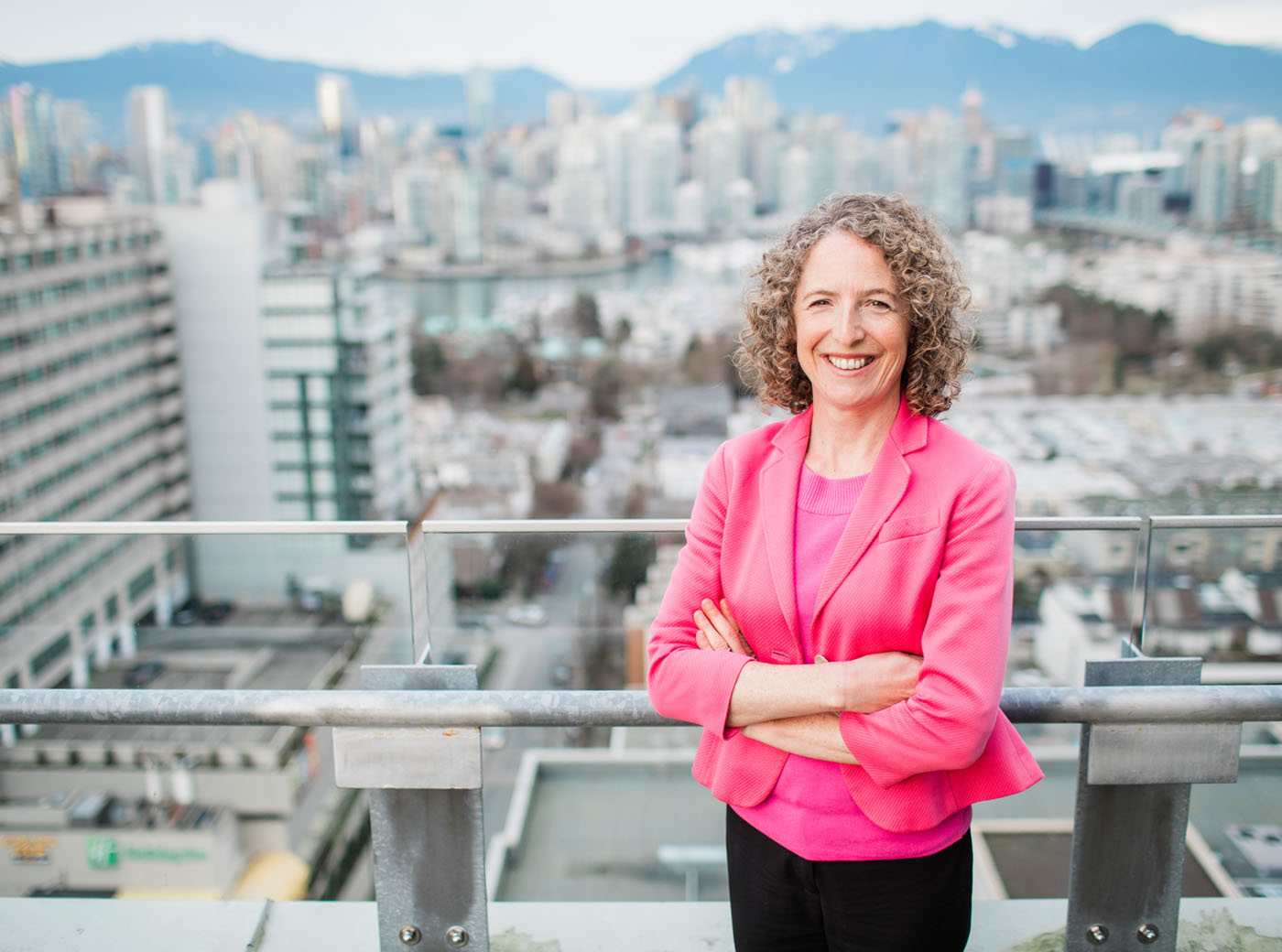
A memorable moment for me these past few months was when I joined Minister of Health Adrian Dix on the podium to announce a new BC Cancer centre in Kamloops. This marks the third new cancer centre, along with Surrey and Burnaby, announced in the past year. I was honoured to share how the BC Cancer Foundation is committed to supporting innovation in research and care in communities across the province — for whom expert cancer care close to home will soon be in reach.
Another highlight was being awarded the CEO of the Year in the Non-Profit Category by Business in Vancouver. It’s an accolade I share with my team — and not just my colleagues at the Foundation.
Our team includes donors, patients, volunteers and BC Cancer staff. People from all walks of life, because unfortunately all of us are impacted by cancer. From the unstoppable Sophie Lui, who was also recently recognized for using her powerful platform for philanthropy, to a basketball community and the mining industry professionals who are determined to help us make a difference.
It includes incredible champions such as the Fitzpatrick family in Kelowna and every one of you who generously give to support advancing cancer care across B.C.
Your donations fuel groundbreaking research poised to change practice, such as the BC Cancer – Victoria clinical trial using AI to improve the accuracy of precision radiation to reduce side effects and enable BC Cancer researchers to be among the first in the world to acquire leading-edge technology.
But most importantly, your support provides strength to everyone that is faced with the unimaginable. As Guillaume and Margaret so poignantly epitomize, we are not a community who gives up. Together, we rise to the challenge. And we couldn’t do it without you on our team.
Sarah Roth
President & CEO
BC Cancer Foundation
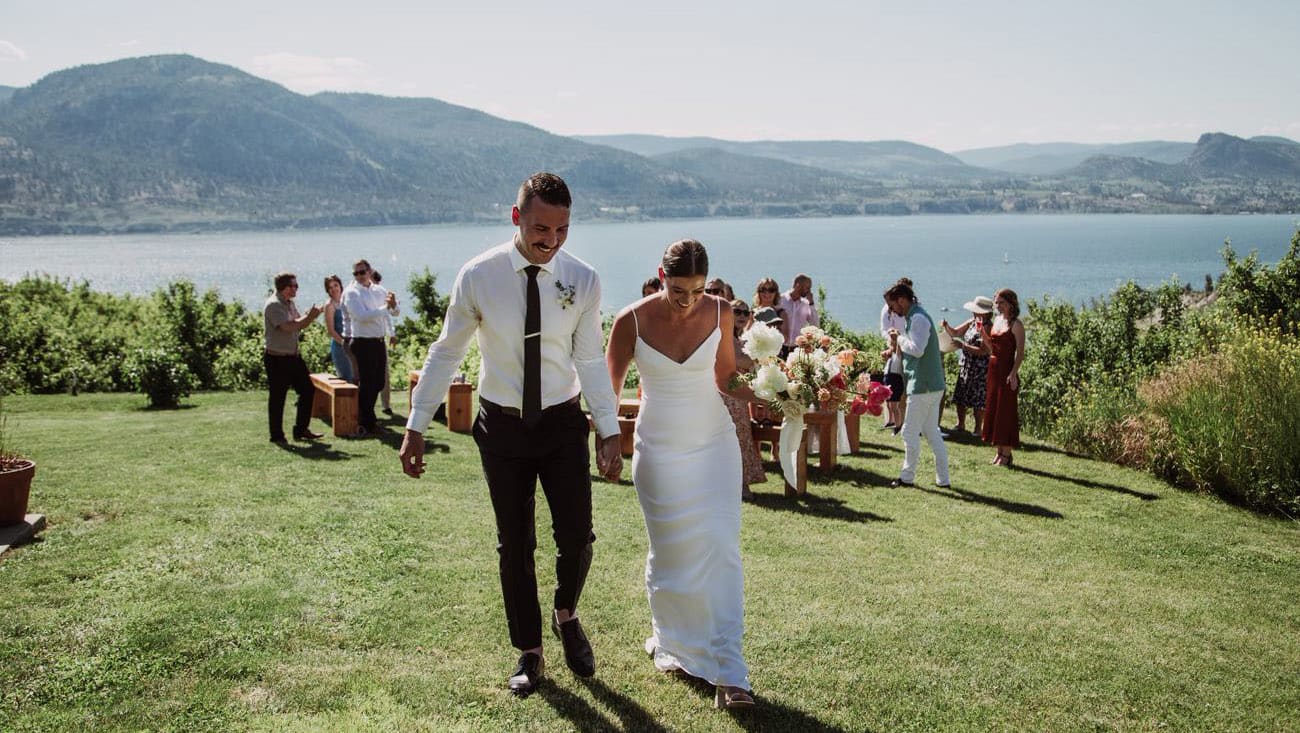
Guillaume and Margaret on their wedding day.
“I was sending these really unhinged emails to venues, saying, ‘Hello, my partner is in surgery and if he wakes up we are looking for this date.”
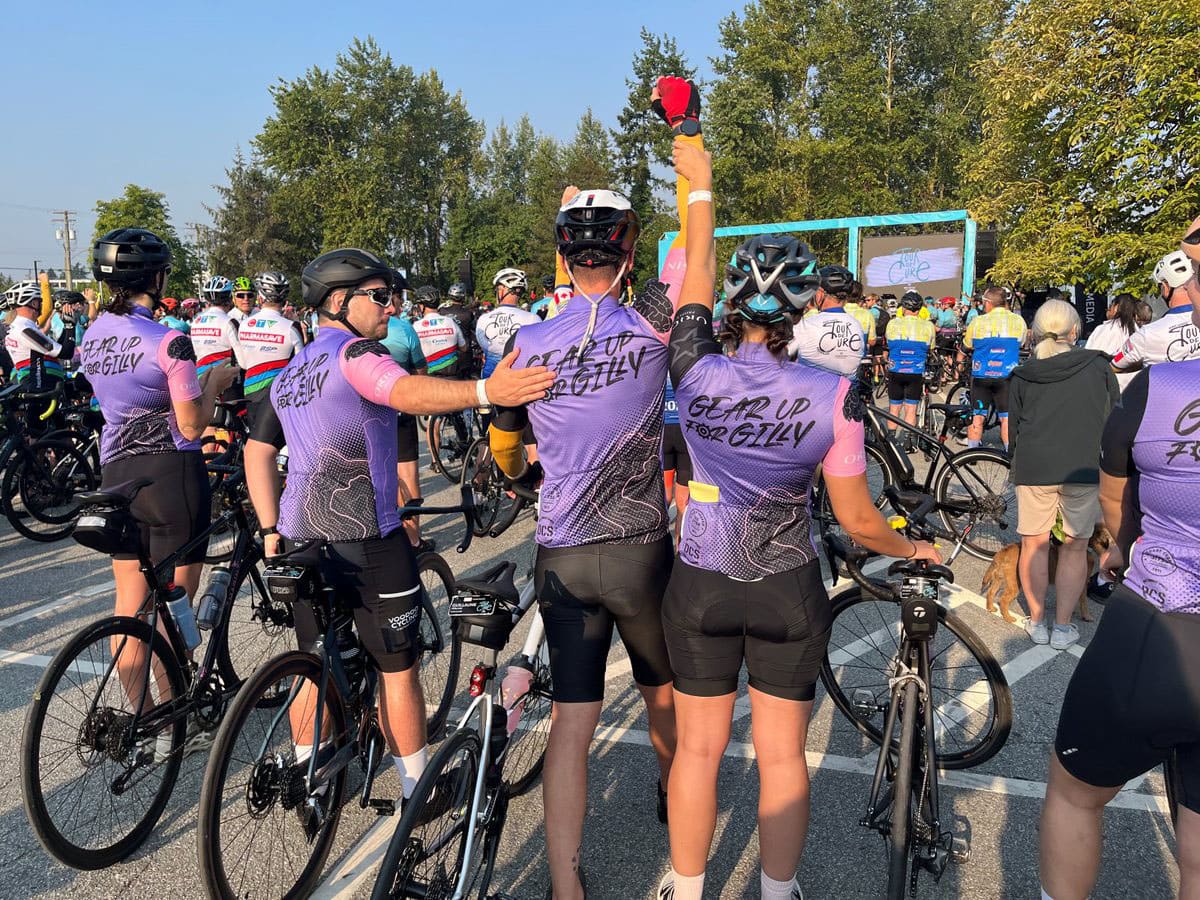
Margaret Erickson and Guillaume Ferland are the quintessential cool, young, professional Vancouver couple. He grew up in Oliver. She grew up in South Surrey. He has a Bachelor of Technology and was working towards his MBA. She has a PhD. Like many millennials, they met on Tinder.
Not so typical is that “Guillaume proposed five months into our relationship,” says Margaret. Even more unusual is that they finally got married seven years after getting engaged, in an intimate Okanagan ceremony, after Guillaume was given six months to two years to live.
Excruciating headaches at the height of the pandemic in the fall of 2020 were misdiagnosed as a concussion due to Guillaume’s martial arts practice. One morning in February 2021, Guillaume was unresponsive. Margaret called 9-1-1 and he was rushed to the hospital where they discovered a 10 cm tumour in his brain.
He immediately had surgery but was warned the cancer would return and would need to be removed again in five to 10 years. It grew back by the end of that year. After 30 days of radiation, he underwent a second surgery but unfortunately due to the tumour’s dangerous position 20% of it was deemed inoperable.
That’s when Margaret threw herself into wedding planning. “I was sending these really unhinged emails to venues, saying, ‘Hello, my partner is in surgery and if he wakes up we are looking for this date.”
The wedding and honeymoon trips to France, Italy and Thailand, made easier by generous gifts from family and friends, were a welcome distraction. When they got home they needed something else to focus on.
Margaret had participated in the Tour de Cure back in 2018. Guillaume dutifully donated, but says, “It wasn’t until I lay perfectly still on the radiation bed, wearing my custom-fitted mask and getting zapped with precise beams of intense radiation, that I really understood just how important it is to fundraise.”
In 2023, they formed Gear Up for Gilly (Guillaume’s childhood nickname) and their team of eight raised $40,000 for the BC Cancer Foundation. Guillaume rode one day of the two-day, 200-km ride, went home and slept, and then returned the next day to cheer his team on.
A third surgery in early 2024 was cancelled after they learned Guillaume’s tumour growth has slowed significantly. “Obviously, it’s great news,” says Margaret, “but we’re still in this perpetual state of limbo. Two years is coming up this spring, so Guillaume will outlive his prognosis. But it’s a tricky spot to be in.”
Guillaume is 36 and Margaret is almost 33. Normally, a couple their age would be looking forward to starting a family, advancing their careers or working hard towards their future, says Margaret. “When that’s taken away from you, what is your life?”
Instead, they’re focused on two days at the end of summer, when they’ll take on the Tour de Cure again and ride together towards Hope — the city and the state of mind.
Join Gear Up for Gilly on Aug. 24-25 for the Tour de Cure, presented by Wheaton Precious Metals — B.C.’s largest cycling fundraiser to fuel research and provide better outcomes for people facing cancer. Sign up at tourdecure.ca.
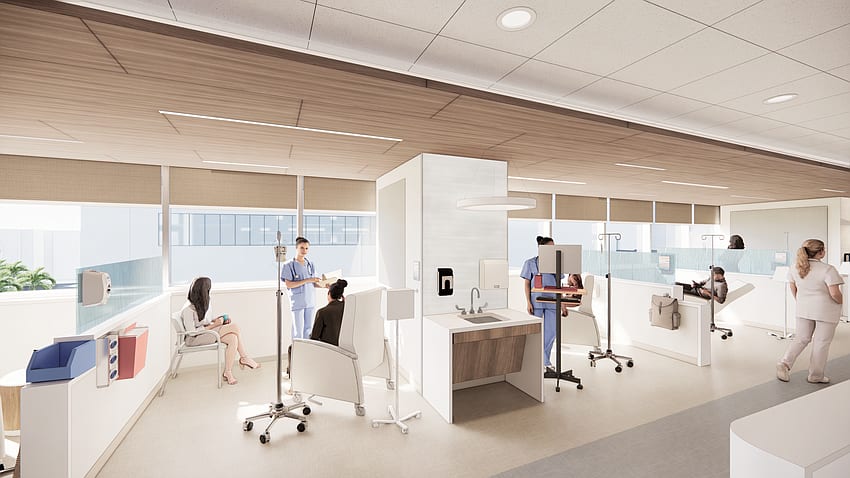
Systemic Therapy Suite, BC Cancer – Kelowna. Concept photo only.
Over 115 generous donors from across the Interior have come together to surpass the $6.1 million fundraising goal to bring a new, state-of-the-art Systemic Therapy Suite to BC Cancer – Kelowna.
The campaign was announced just over a year ago and originally expected to take two years to complete. Its remarkably accelerated timeline was largely driven by local volunteers, led by Jill White and Doug Chambers, who worked tirelessly to raise awareness among their communities and peers.
“We’re humbled and inspired by the community’s overwhelming support to profoundly change the landscape of cancer care and research in the Interior,” say Sarah Roth, BC Cancer Foundation’s President & CEO and Dr. Ross Halperin, BC Cancer – Kelowna’s Executive Medical Director.
The new suite will increase BC Cancer – Kelowna’s systemic therapy capacity by 40%, which is essential to meeting the region’s growing needs. The centre will also become the first space outside Vancouver to offer early phase clinical trials, ensuring more patients have access to the most cutting-edge treatments close to home.
The Honourable Ross Fitzpatrick, O.C., O.B.C. and Linda Fitzpatrick generously donated the final $725,000 to complete the campaign.
“It’s an honour to be able to help the community in this way,” say Ross and Linda. “Supporting BC Cancer – Kelowna means giving hope to those facing cancer now, and in the years to come.”
BC Cancer – Kelowna is undergoing the largest revitalization in its 25-year history, bringing world-class care to the Interior and scaling up local research capacity. Inspired by this success, the Foundation is already planning its next transformational campaign for BC Cancer – Kelowna and kickstarting fundraising for the new BC Cancer centre in Kamloops.
To support enhancing care in the Interior, contact Mischa Mueller at 250.979.6652 or mischa.mueller@bccancer.bc.ca
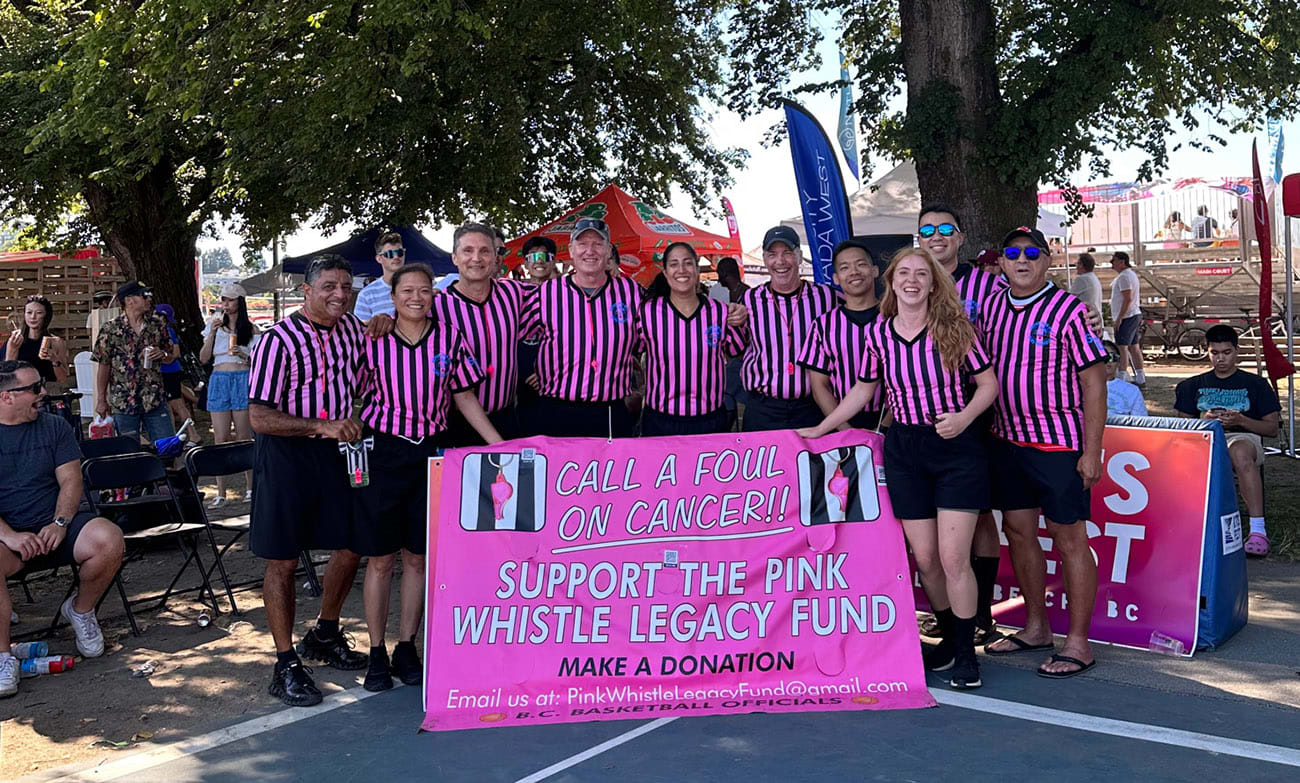
Karn Dhillon (far left) and the BC Basketball officials who are calling a foul on cancer.
From calling a foul on cancer to digging deep for donations, a long-running and a relatively new community fundraising event both made a big impact.
Used to calling fouls on the court, BC Basketball official Karn Dhillon knew he had to blow the whistle on cancer after his sister, nephew and a fellow referee were all diagnosed with brain cancer within months of each other. “Hit after hit after hit,” he says. “I knew I had to do something.”
What began as a bag of 100 eye-catching, available-by-donation pink whistles in 2009 has grown into a 600-strong “Karnie’s Army” of BC Basketball officials who in 15 years have raised more than $270,000 for the BC Cancer Foundation through the Pink Whistle Legacy Fund.
“Whether you’re a player, a coach, a referee or a fan, when it comes to cancer we’re all on the same team,” says Karn. “We’ve all been touched by this disease.”

Exploring for a Cure event in Vancouver
The second annual Exploring for a Cure at the AME Roundup in Vancouver had a hard act to follow, says its organizer Neil Burns, vice president of technical services at Wheaton Precious Metals and BC Cancer Foundation board member.
In its inaugural year in 2023, the gathering of mining professionals featured astronaut Chris Hadfield as a keynote speaker and raised more than $160,000 for the BC Cancer Foundation.
This year, former Olympic hockey player Hayley Wickenheiser — who knows a thing or two about precious metals (she led Canada to four golds and one silver) and the need for public investment in health care (she’s an emergency room doctor) — helped the event score another $220,000.
“I’m extremely proud of our community, sponsors and generous attendees who came together to help us far exceed last year’s fundraising total,” says Neil. “I’m looking forward to growing the event — and its impact in providing hope for people facing cancer — even more next year.”
Register and learn more about hosting a fundraising event in your community, or contact us at communitygiving@bccancer.bc.ca

Dr. Jessica McAlpine.
Dr. Jessica McAlpine works just two blocks from the hospital where she was born. But the path to becoming head of the Division of Gynecologic Oncology at BC Cancer took her to Johns Hopkins, Stanford and Yale first, to study medicine, gynecology and obstetrics, before Vancouver’s renowned Ovarian Cancer Research Program (OVCARE) drew her back home.
Under Dr. McAlpine’s direction, OVCARE’s Tissue Bank houses more than 86,000 tissue specimens from over 9,800 patients that have been shared with national and international collaborators as a foundation for translational research, contributing to over 1,500 publications and discoveries that have led to changes in clinical practice.
But it’s her unique role as a surgeon-scientist, which allows her to bridge patient care and research, that has helped her advance the way the world diagnoses and treats endometrial, ovarian and vulvar cancers.
“Working with patients makes me more relevant in research. I get to see where the deficiencies are — the challenges in pathology reporting or the lack of nuance in treatments such as giving the same drugs to all patients — and then we can tackle them in the lab.”
One of Dr. McAlpine’s more notable contributions is the development of ProMisE (Proactive Molecular Risk Classifier for Endometrial Cancer). Prior to ProMisE, the same patient may have received differing diagnoses and recommended treatment options (type of surgery, chemotherapy or radiation) resulting in unnecessary treatment with adverse side effects or a missed opportunity for a cure.
As a classification tool for endometrial cancer, ProMisE provides prognostic information and guides targeted treatment, says Dr. McAlpine. “Some endometrial cancers can be safely managed by a gynecologist in a patient’s own community while others are recommended to undergo more complex surgery and treatment at a BC Cancer centre. Through ProMisE we can deliver consistent and equitable care and make recommendations that will be best for their cancer, no matter where a person lives.”
Adopted by the World Health Organization, ProMisE can also identify patients with a potential inherited genetic syndrome that places them at increased risk of developing other cancers. By recognizing these individuals, it allows patients and their relatives to undergo life-saving screening or risk-reducing steps.
Dr. McAlpine’s team also discovered up to half of endometrial cancers don’t need chemotherapy or radiation prompting the TAPER study, which identifies early stage endometrial cancers with low recurrence risk. The strategy, sparing hundreds of women unnecessary toxic treatment, is expanding across Canada. Another OVCARE trial is gaining global recognition for similar findings in rare and understudied vulvar cancers.
BC Cancer Foundation donations are crucial to fuelling research in underfunded gynecological cancers, says Dr. McAlpine. “Endometrial cancer is actually the fourth most common cancer in women, and on a trajectory to be second only to breast in the next couple of decades. And yet it has a sliver of the investment compared to prostate cancer.”
Despite these challenges, Dr. McAlpine and the OVCARE team are making a real difference in the lives of women facing these diseases. “I really appreciate the breadth of care in women’s health, being able to take care of a 14-year-old to an 89-year-old,”says Dr. McAlpine. And if sometime on that life journey they face cancer, advances made today are ensuring the very best in care will be waiting for them.
To support Dr. McAlpine in advancing research and care in gynecological cancers, please contact Fatima Hassam at 604.877.6226 or fatima.hassam@bccancer.bc.ca
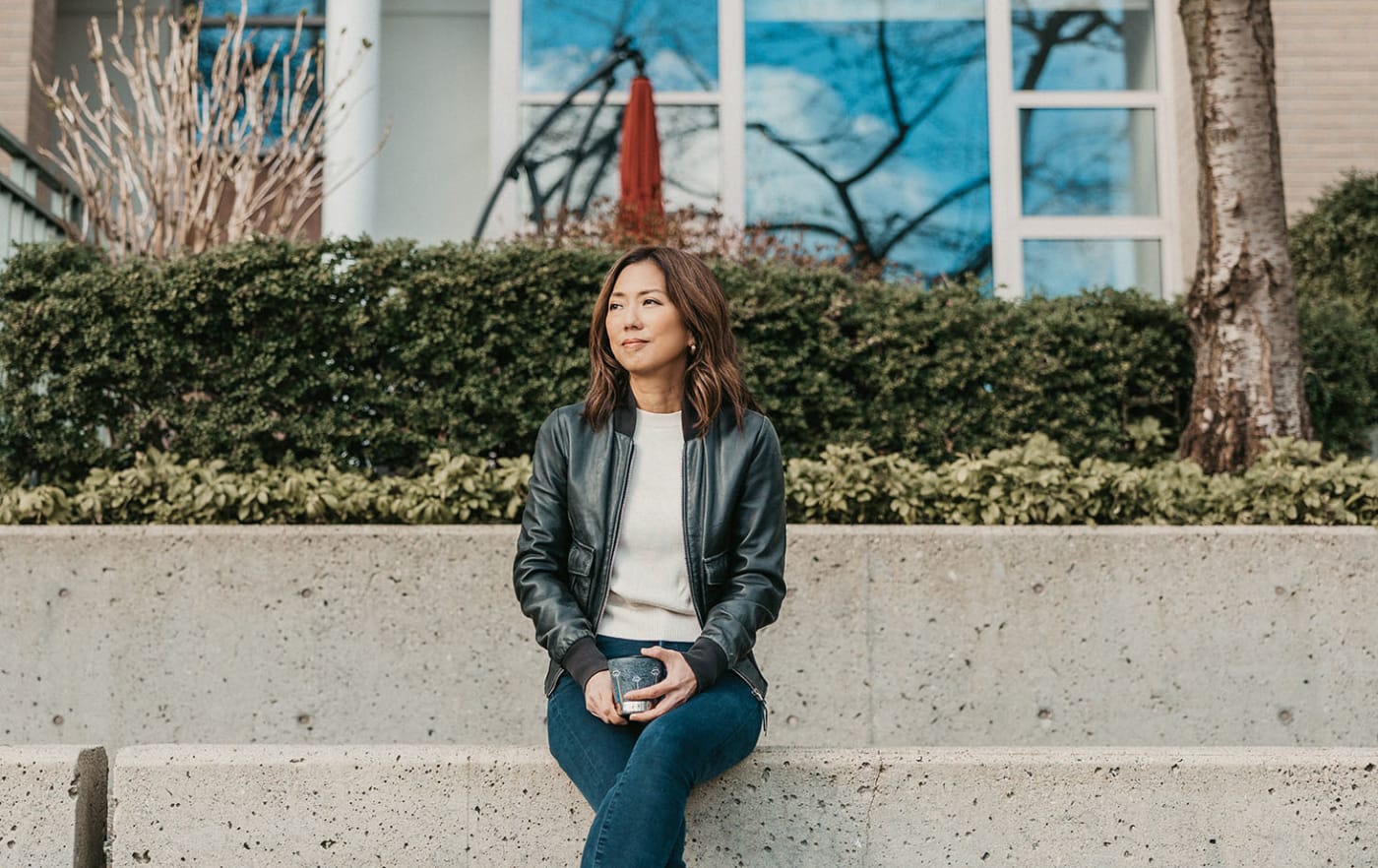
Sophie Lui, Global BC News Anchor.
“It's a little intimidating and daunting to think that I have power,” says Global BC News Anchor Sophie Lui of her ranking in Vancouver magazine’s 2024 list of the city’s 50 biggest power players. “But you know, there’s that saying: ‘With great power comes great responsibility.’”
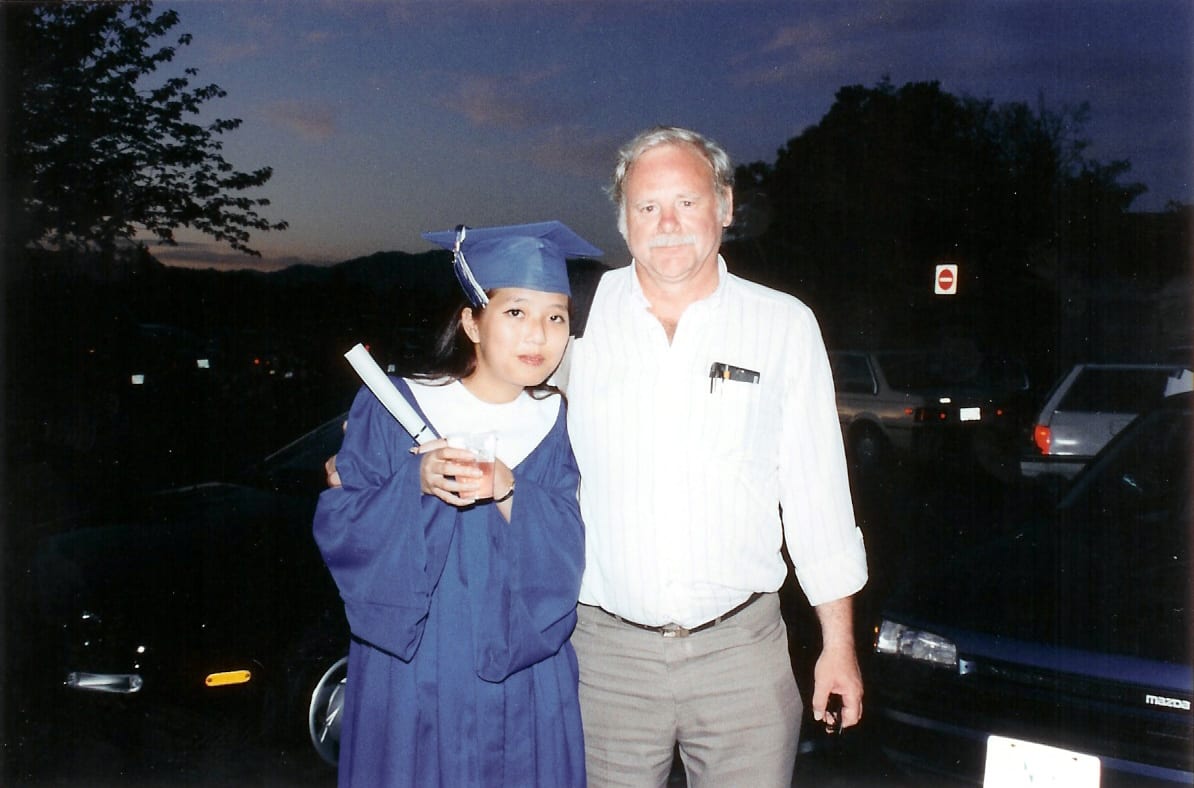
Sophie Lui on her graduation day with her father, Jeff, who she lost to colon cancer in 2020.
Using her platform to do good is what drew Sophie to become a cabinet member of the BC Cancer Foundation’s Beyond Belief campaign. Having supported the Foundation, as an emcee and through the Tour de Cure annual cycling fundraiser, she joined in an official capacity after losing her dad, Jeff Allan, to colon cancer in 2020.
“He was my dad from the time I was seven,” she says of her stepfather who stoically faced the disease for five years before quickly deteriorating at the height of the pandemic. When asked how she held it together every night in the public eye during that difficult time, Sophie’s answer is simple: “I didn’t.”
“I started crying on the air a lot that year. But I wasn’t the only one. When all this was happening, everyone was very uncertain about everything. I remember I was doing a voice over ‘thank you’ to healthcare workers — to BC Cancer staff who continued to selflessly do their job, despite the lockdown — and I got very emotional.” So much so that her co-anchor Squire Barnes had to take over, she says.
A few years later, while speaking at a BC Cancer Foundation event, Sophie came face to face with her dad’s oncologist. “My dad wasn’t under Dr. Renouf’s care for very long because everything happened so fast. But he listened and he explained, and he gave my parents hope.”
Sophie wants to pass that same hope on to other families. “We will all deal with cancer, but we’re in this together.” One thing we can do, she says, is support breakthroughs in research and the compassionate care — and the hope it provides — at BC Cancer.
Learn more about volunteering with the BC Cancer Foundation.
Researchers at BC Cancer were among the first in the world to acquire technology that will significantly advance their work to understand lymphoid cancers.
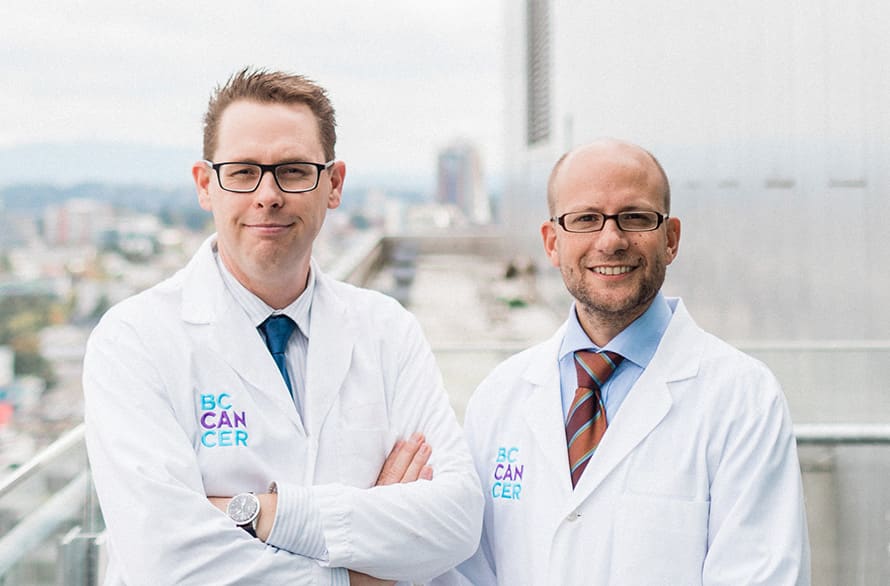
CLC Co-directors Drs. David Scott and Christian Steidl.
Researchers at BC Cancer were among the first in the world to acquire technology that will significantly advance their work to understand lymphoid cancers.
Thanks in part to the Gayton family’s generous $500,000 gift and the Tour de Cure team Blood, Sweat, and Cures who, captained by BC Cancer’s Drs. Steidl and Scott and BC Cancer Foundation Board Member Alex Blodgett, have raised more than $1.5 million, a new CosMX SMI (Spatial Molecular Imaging) machine is now installed at BC Cancer’s Centre for Lymphoid Cancer (CLC).
The CosMX SMI is enabling the CLC team to analyze large quantities of samples in more detail, and at a much lower cost, enhancing their world-leading research in a group of cancers that are increasing in incidence.
To support life-saving technology and research at the CLC contact Elissa Morrissette at 604.707.5992 or elissa.morrissette@bccancer.bc.ca
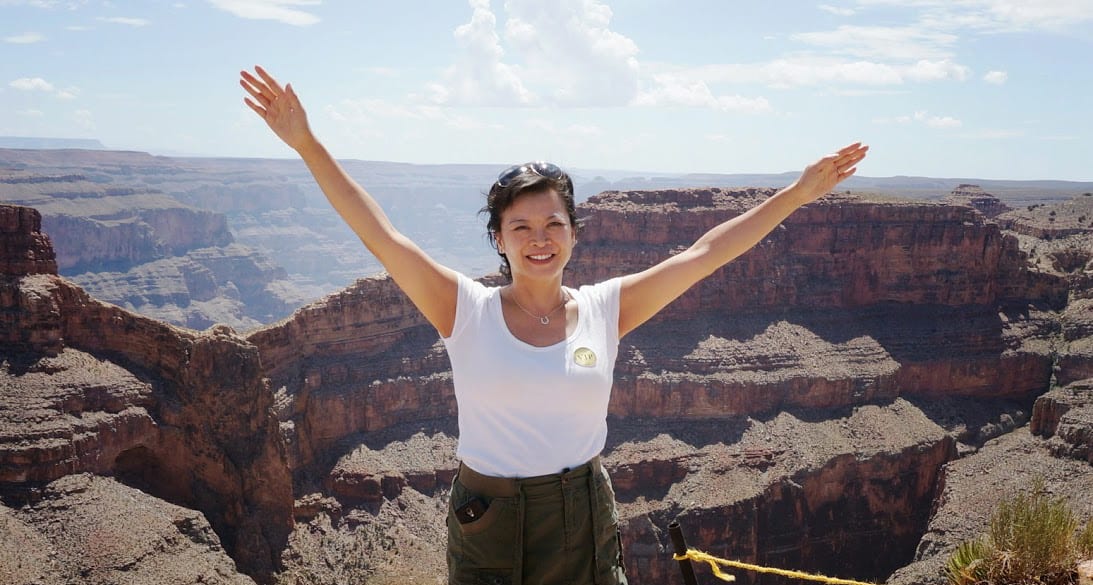
Marita Luk celebrates post-treatment at the Grand Canyon.
When facing breast cancer over 10 years ago, Marita Luk was also juggling a busy job, a masters degree and her husband’s and aging parents’ own health issues, and yet it was one of life’s little stressors she recalls most vividly — “finding parking.”
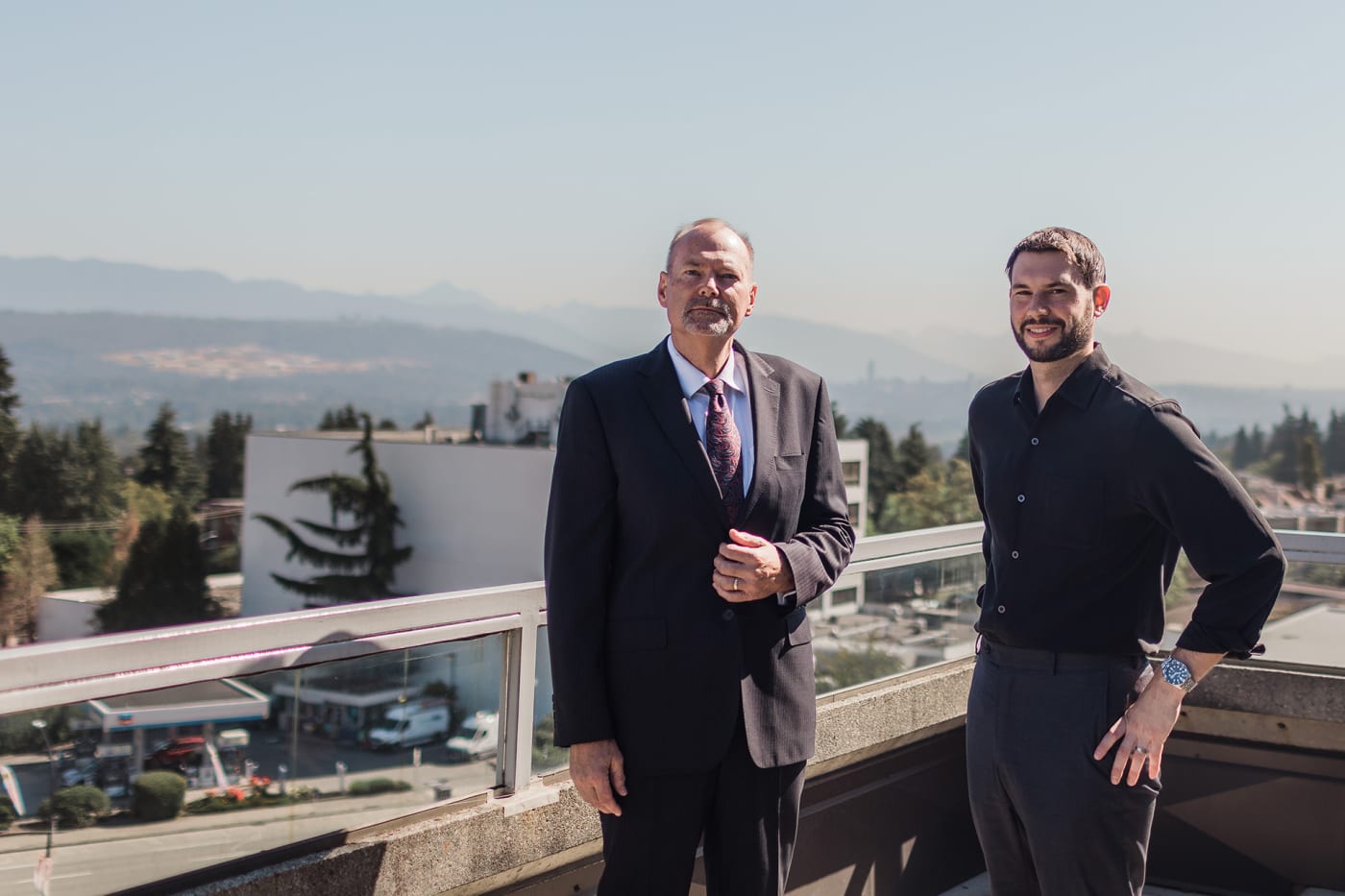
Bill (left) and John McCarthy are helping to realize their long-time dream of bringing a cancer centre to Burnaby.
“I didn’t want to inconvenience people, or ask anyone to take time off work, so I drove myself to most appointments — even during chemotherapy.” And so, the 30-minute commute from her home in Burnaby was capped by circling the block around BC Cancer – Vancouver.
“I wanted the free, two-hour street parking,” she laughs. After treatment, she had to navigate rush hour traffic and repeat the bumper-to-bumper drive back home. If her treatments had been in Burnaby, Marita says she would have felt more comfortable leaning on loved ones to help her make the short trip.
During her cancer journey, Marita formed a strong bond with a group of women also undergoing treatment. “We actually had a reunion when all of our hair grew back.” She remains close with a few of them — they even travelled to Las Vegas together — but it’s difficult to connect regularly with everyone scattered across the Lower Mainland.
With the news that Burnaby is getting its own cancer centre, Marita is incredibly pleased care — supported by nearby family and friends — will be available for people in her community.
“Burnaby is home,” she says. “You don’t want to have to leave home when you’re going through something as difficult as cancer.”
The McCarthy family also call Burnaby home. Bill McCarthy, his son John and the McCarthy family’s support of BC Cancer goes back four generations to Bill’s grandfather, John Jambor. After receiving treatment for jaw cancer in Vancouver in the early ’80s, and witnessing patients cut off from their family, he purchased landlines for every bed in the ward.
He continued to give generously, establishing the Jambor Knowledge Fund to support cancer research, and left a remarkable bequest in his estate plans that Bill grew to an astounding $21.4 million and gifted to the BC Cancer Foundation in 2012.
Now, an extraordinary $5 million donation from the McCarthy family brings the BC Cancer Foundation’s $10-million fundraising campaign for a new BC Cancer centre in Burnaby to past the halfway mark. In recognition of their long-time dedication and support of BC Cancer and Burnaby, the new centre will be named ‘BC Cancer – Burnaby McCarthy Centre.’
“It’s a vision and a strategy we’ve supported for decades, comprehensive cancer control with care closer to home by expanding into different regions across B.C.,” says John, who is currently the chair of the board of directors for the BC Cancer Foundation.
Bill adds: “We hope our contribution inspires others to support the vital work of the BC Cancer Foundation, ensuring that the residents of Burnaby and beyond have access to world-class cancer care in their community.”
To join the McCarthy family in supporting a new BC Cancer centre in Burnaby please contact Scott MacDonald at 778.874.6017 or scott.macdonald@bccancer.bc.ca
“Every cancer treatment we have today was made possible by a clinical trial,” says Dr. Bernie Eigl, director of BC Cancer’s Provincial Clinical Trials Office. Not only are the more than 350 clinical trials operating a year in B.C. crucial to advancing care, they’re a lifeline for patients who are out of options.
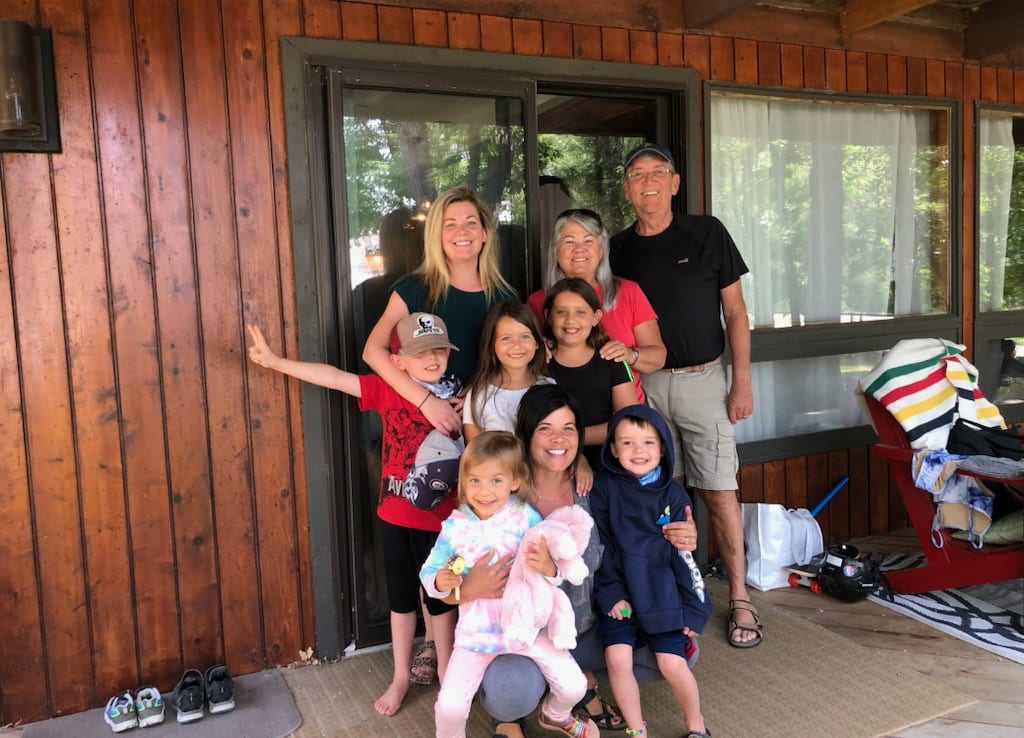
Allan Wolfram with his family.
For Allan Wolfram, participating in leading-edge research ensured he was there to celebrate the first birthday of his youngest grandson — whom he would not have met without the life-saving opportunity.
Allan was living in Winnipeg when he was diagnosed with esophageal cancer in 2019 and given up to a year on palliative chemotherapy. When he learned of a trial in immunotherapy, a treatment that harnesses the body’s immune system, he jumped at the chance. The only problem, it was at BC Cancer – Kelowna.
“It was the first time in months I had any hope,” says Allan, who days later boarded a plane, and eventually moved, to B.C’s Interior.
Within hours of his first treatment, he regained feeling in his toes which he had lost due to the fact that, unbeknownst to Allan, his cancer had metastasized to his brain. After a CT revealed this, the trial was put on hold and Allan was referred to a neurosurgeon. On the day of the operation, a final scan yielded a surprise: the brain tumour had shrunk and he wouldn’t surgery.
BC Cancer oncologist Dr. Kaethe Clarke was thrilled to inform Allan he could resume treatment on the trial. A month later, she had more good news: the tumour on his esophagus had disappeared. Allan continued treatment for several years, and is still carefully monitored, but shows no signs of cancer. He’s incredibly grateful for the added years and to have played a role in advancing treatment for others.
“Every time we see a patient we should be asking if there’s a clinical trial they can take part in ,” says Dr. Eigl.” Thanks to a province-wide system, BC Cancer is in a unique position to support this. Historically, however, participating in a trial required a patient to travel or temporarily relocate to a major centre.
“Now, there are quite a few initiatives underway, and BC Cancer is a leader in this, to increase access for patients in more remote communities,” says Dr. Eigl.
One example the BC Cancer Foundation is fundraising $2.2 million to support, is SIMPLIFY, a BC Cancer – Prince George-led trial testing a single dose of high-precision radiation in metastatic cancer compared to up to eight weeks of traditional radiotherapy, that will be available at all six provincial centres.
Unlike pharmaceutical-funded trials, which focus on bringing new drugs to market, research with a “less is more” approach, especially in radiation therapy, is almost entirely fuelled by donors, says Dr. Eigl.
“Can we give less treatments to save time and money but also benefit patients in terms of reducing harmful side effects? Philanthropic support is crucial to do this kind of research.”
Learn more about how your donations increase access to life-saving research and clinical trials that advance care across the province.
With the help of artificial intelligence (AI), BC Cancer researchers from Victoria and Surrey are poised to change the course of care for men facing prostate cancer.
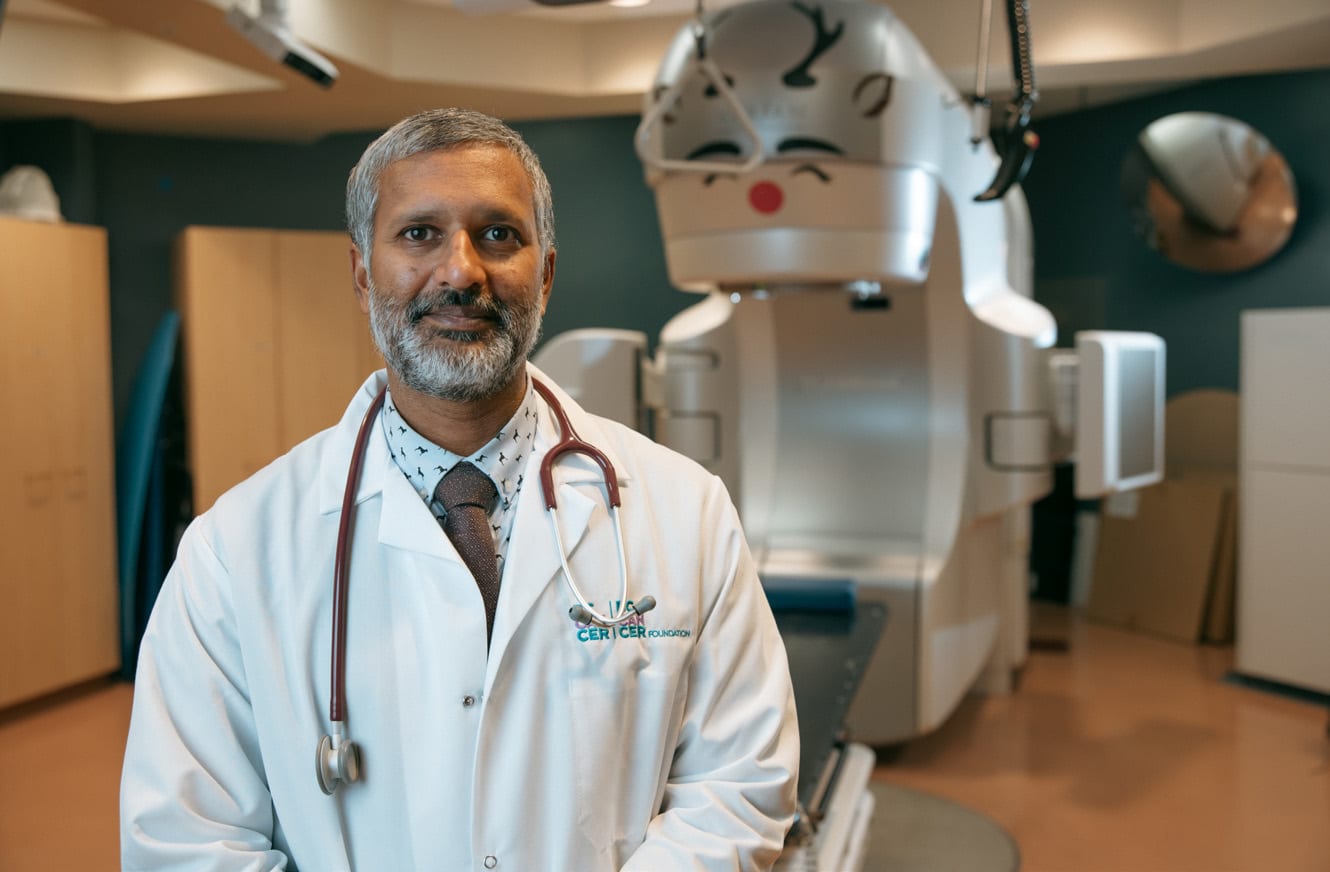
Dr. Abe Alexander.
The team, led by Drs. Abraham Alexander and Winkle Kwan, is preparing to launch a cutting-edge clinical trial called ADAPT-25 that will test the efficacy of two doses of Stereotactic ablative radiotherapy (SABR) on curative prostate patients.
SABR is a highly precise and effective form of radiation that reduces side effects by limiting exposure to healthy tissues. And the AI algorithm will allow technicians to guide the beams with even more precision, adapting to daily changes in the patient’s body.
For a picture of the power of SABR, the same team recently published research that reduced the standard of care for curative prostate cancer patients from five to eight weeks of daily traditional radiation to just five weekly doses of SABR.
“This change has made a huge difference for our patients’ quality of life,” says Dr. Alexander. “On the Island, patients who live outside of Victoria don’t need to stay in the city. They can come down, receive treatment, go home and come back the following week.”
Zooming out on the impact of this research, prostate cancer is the most common cancer among men. Decreasing the number of radiation visits per patient is creating more capacity in the cancer system for others to access timely treatment.
With the trial launching later this year, the BC Cancer Foundation is fundraising $500,000 to bring it to life.
To support this critical research, contact William Litchfield at 250.667.8690 or william.litchfield@bccancer.bc.ca
Dr. Connie Eaves, a world-renowned pioneer in breast cancer and leukemia research, beloved mentor, inspirational leader and mother — in life and in science.
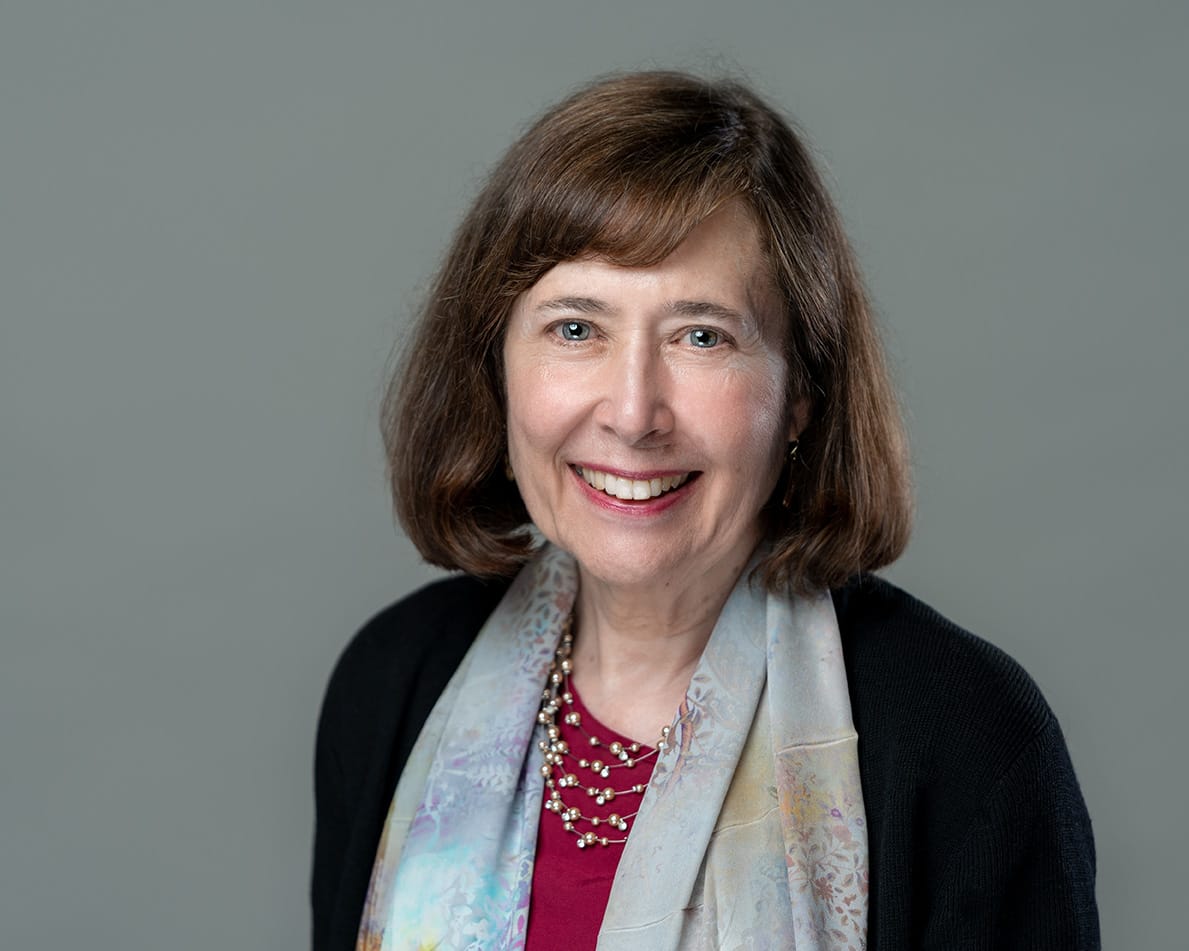
Dr. Connie Eaves, a world-renowned pioneer in breast cancer and leukemia research, beloved mentor, inspirational leader and mother — in life and in science.
As BC Cancer’s longest serving scientist, Dr Eaves’ career spanned more than five decades in which her discoveries and groundbreaking research — including the development of a technique to separate cancerous from normal stem cells — have become the global gold standard. A devoted advisor to the next generation of researchers, and a passionate advocate for more women in science, she leaves a lasting legacy in the hundreds of trainees she guided.
Learn more and donate in Dr. Eaves’ honour to support research at BC Cancer’s Terry Fox Laboratory, of which she was a co-founder.